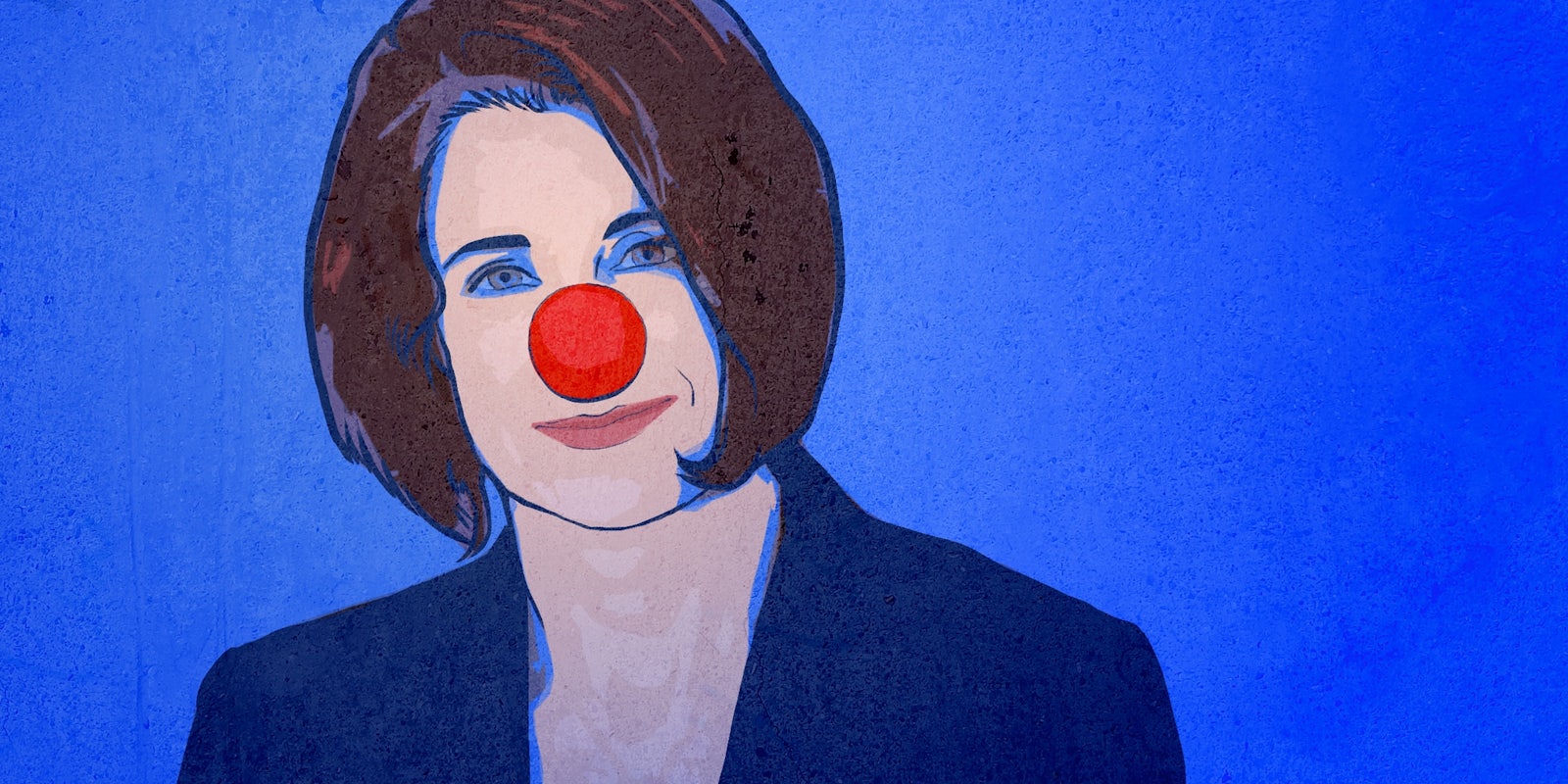Female comedians in Chicago held a blackout in January to boycott comedy theaters, classes, and shows that made female comics feel unsafe—women had come forward with stories of harassment and assault in the scene. When Chicago nonprofit Women in Comedy shared an open Google form called “Gross Things That Happened to Me As A Woman in Comedy,” it received hundreds of responses.
This turmoil compelled New York City comic Lynn Harris to spearhead the creation of Comedy for Girls, an organization that will empower young women interested in comedy learn the art of the joke and spurt a growth in self-confidence.
“It’s a pretty good time for women in comedy, I wouldn’t call it great,” Harris tells the Daily Dot. “But how about we make it great? How about we create a project that gives individuals comedy skills and life skills?”
In June, Harris launched an Indiegogo campaign to fund a pilot workshop. According to the Indiegogo, it will consist of “joke-writing, persona-building, and performance.” The campaign was asking for $2,000 to hire teachers and pay for pizza.
Comedy for Girls (the name itself may change, per the Indiegogo) met its goal within a day and a half of going live, and eventually raised a total of $3,469 with the help of 41 backers.
“It was very validating,” Harris says. “The thing about crowdfunding is that it’s really an expression of people saying, ‘That should be a thing.’ So I think even though I asked for something very small that’s just the tiniest sliver of what will be needed to make this whole thing happen, it’s clear that people are sold on the idea.”
As a veteran comic who did traditional standup for 10-plus years, Harris is no stranger to the sexism of the industry. She says she is lucky because she never experienced any extreme incidents, but like most women in the business, was a constant victim to subtleties.
Harris hasn’t been in standup for the past five years or so and she says what’s most surprising to her is that when she talks to women performing, they have the same problems she did. Nothing has changed.
“You get introduced as the ‘lady comic’ while everyone else is just the comic,” she says. “If you’re a dude, all you have to do for the next eight minutes is prove that you’re funny. If you’re the only lady on the lineup you then have to prove for the next eight minutes that all women are funny.”
One comedian who deals with constant sexism is Elsa Waithe, who will be one of the teachers at the Comedy for Girls pilot workshop. Add her sex with the fact that she is also a trans African-American woman, and Waithe says working in comedy can sometimes be frustrating whether you’re dealing with intersectional issues or just a white, straight woman.
“I see a lot of the ways that women are harassed, I see what the guys sometimes do, I see how tough it is for a cis woman in comedy,” Waithe says. “I don’t experience those things, I experience more subtle unspoken racism or discrimination. I see how tough it is for women across the board, though.”
In the pilot workshop Waithe, Harris, and other veteran comedians plan to teach the young comics the foundations of the joke, helping them find their own angle and build the self-confidence to perform.
“Things you can take away from in a day: confidence, the ability to take criticism, how to rewrite, how to take 500 words and turn them into a 10-word idea, and how to be alone on a stage and not die,” Harris says. “I think that in one day we can give people the mechanics of joke writing and the beginnings of their own comedic voice and also what that comedic voice can give them in their lives.”
One thing that Waithe says the teachers don’t plan to teach the teens in the workshop is anything directly about sexism.
“What I want to impart on the girls is to just go do it,” Waithe says. “I don’t even want to put it in their mind that there might be roadblocks.”
Harris emphasizes that Comedy for Girls is still very much a work in progress. She doesn’t see the organization being a school so much as a “girls comedy experience.” While there will be a face-to-face element of the group, she says that will only be part of the course.
“I really believe that we have to build something online for purposes of reach and scale and gizmos and gadgets that will allow young people to interact and collaborate right then,” Harris says. “We want to get feedback, create a community, and also just be found.”
She also notes that it’s likely not every girl who joins Comedy for Girls will actually become a comedian, and that’s OK.
“If they just want to get some comedy skills and the life skills that goes with it like confidence, writing a better speech for running for class president, or sassing back to a bully, that’s great,” Harris says. “But if they want to go further… we want to help open doors for them too.”
Harris says she hopes Comedy for Girls will help diversify the comedy market and in the long run show all women that they don’t need to hold back who they truly are because of gender stereotypes.
“I really do believe that it’s important to enable women and anyone who identifies as such to have the opportunity to fight those really tired, old stereotypes about how they’re not supposed to be funny,” Harris says. “We have to figure out ways to get past this and I think comedy is the perfect way to do it.”
When it comes to amplifying female voices and ideas in comedy, Harris says it’s easy—all you have to do is teach them how to hold the mic.


